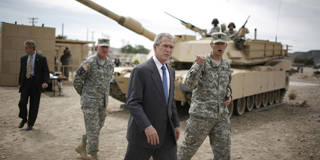For most of the post-World War II era, the United States has abided by international law and made the world a safer place. But President George W. Bush’s disastrous military adventurism so powerfully undermined trust in the US-led international order that it has become nearly impossible to tackle pressing global challenges such as climate change.
TOULOUSE – In December 2003, roughly nine months into the Iraq War that would forever define his legacy, then-US President George W. Bush was asked whether his administration’s policies complied with international law. “I don’t know what you’re talking about by international law. I better consult my lawyer,” he joked. Bush’s disastrous military adventurism starkly illustrated the importance of international norms and institutions, as well as the consequences of disregarding them. Unfortunately, we seem to have forgotten this lesson once again.
Since the end of World War II, the United Nations has been the cornerstone of the international rules-based order. While numerous other international agreements address issues such as chemical weapons, biological warfare, and regional stability, the UN has been entrusted with the overarching role of maintaining global peace and stability. What made it effective, at least for a while, was the support of the world’s liberal democracies and, crucially, the unwavering commitment of both Democratic and Republican administrations in the United States.
To be sure, the US has long been ambivalent about some aspects of the international order, as demonstrated by its long-standing refusal to join the International Criminal Court. For the most part, however, the US has adhered to the global rulebook, despite the enormous political and economic power it acquired in the aftermath of World War II, which would have enabled it to do whatever it wanted unilaterally.

TOULOUSE – In December 2003, roughly nine months into the Iraq War that would forever define his legacy, then-US President George W. Bush was asked whether his administration’s policies complied with international law. “I don’t know what you’re talking about by international law. I better consult my lawyer,” he joked. Bush’s disastrous military adventurism starkly illustrated the importance of international norms and institutions, as well as the consequences of disregarding them. Unfortunately, we seem to have forgotten this lesson once again.
Since the end of World War II, the United Nations has been the cornerstone of the international rules-based order. While numerous other international agreements address issues such as chemical weapons, biological warfare, and regional stability, the UN has been entrusted with the overarching role of maintaining global peace and stability. What made it effective, at least for a while, was the support of the world’s liberal democracies and, crucially, the unwavering commitment of both Democratic and Republican administrations in the United States.
To be sure, the US has long been ambivalent about some aspects of the international order, as demonstrated by its long-standing refusal to join the International Criminal Court. For the most part, however, the US has adhered to the global rulebook, despite the enormous political and economic power it acquired in the aftermath of World War II, which would have enabled it to do whatever it wanted unilaterally.